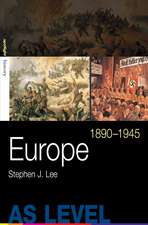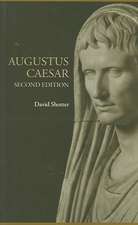European Border Regions in Comparison: Overcoming Nationalistic Aspects or Re-Nationalization?: Routledge Studies in Modern European History
Editat de Katarzyna Stokłosa, Gerhard Besieren Limba Engleză Hardback – 13 ian 2014
| Toate formatele și edițiile | Preț | Express |
|---|---|---|
| Paperback (1) | 265.60 lei 6-8 săpt. | |
| Taylor & Francis – 14 oct 2024 | 265.60 lei 6-8 săpt. | |
| Hardback (1) | 1124.39 lei 6-8 săpt. | |
| Taylor & Francis – 13 ian 2014 | 1124.39 lei 6-8 săpt. |
Din seria Routledge Studies in Modern European History
-
 Preț: 341.55 lei
Preț: 341.55 lei - 9%
 Preț: 934.94 lei
Preț: 934.94 lei -
 Preț: 324.89 lei
Preț: 324.89 lei -
 Preț: 288.80 lei
Preț: 288.80 lei -
 Preț: 311.41 lei
Preț: 311.41 lei -
 Preț: 350.12 lei
Preț: 350.12 lei - 9%
 Preț: 935.39 lei
Preț: 935.39 lei -
 Preț: 326.60 lei
Preț: 326.60 lei - 18%
 Preț: 1057.09 lei
Preț: 1057.09 lei - 26%
 Preț: 846.50 lei
Preț: 846.50 lei -
 Preț: 369.73 lei
Preț: 369.73 lei - 18%
 Preț: 1056.28 lei
Preț: 1056.28 lei - 18%
 Preț: 1062.98 lei
Preț: 1062.98 lei - 28%
 Preț: 818.71 lei
Preț: 818.71 lei - 15%
 Preț: 461.03 lei
Preț: 461.03 lei -
 Preț: 430.37 lei
Preț: 430.37 lei - 18%
 Preț: 942.65 lei
Preț: 942.65 lei -
 Preț: 452.15 lei
Preț: 452.15 lei - 18%
 Preț: 1113.12 lei
Preț: 1113.12 lei - 31%
 Preț: 765.19 lei
Preț: 765.19 lei - 18%
 Preț: 1113.16 lei
Preț: 1113.16 lei - 31%
 Preț: 764.20 lei
Preț: 764.20 lei - 18%
 Preț: 1183.71 lei
Preț: 1183.71 lei - 18%
 Preț: 910.22 lei
Preț: 910.22 lei - 18%
 Preț: 1108.37 lei
Preț: 1108.37 lei - 18%
 Preț: 1113.16 lei
Preț: 1113.16 lei - 18%
 Preț: 1004.20 lei
Preț: 1004.20 lei - 18%
 Preț: 1055.51 lei
Preț: 1055.51 lei - 30%
 Preț: 826.43 lei
Preț: 826.43 lei -
 Preț: 485.40 lei
Preț: 485.40 lei - 30%
 Preț: 821.53 lei
Preț: 821.53 lei - 30%
 Preț: 796.11 lei
Preț: 796.11 lei - 18%
 Preț: 2219.12 lei
Preț: 2219.12 lei - 26%
 Preț: 822.36 lei
Preț: 822.36 lei - 18%
 Preț: 1057.75 lei
Preț: 1057.75 lei - 31%
 Preț: 736.38 lei
Preț: 736.38 lei - 18%
 Preț: 1066.09 lei
Preț: 1066.09 lei - 31%
 Preț: 764.20 lei
Preț: 764.20 lei - 18%
 Preț: 1058.65 lei
Preț: 1058.65 lei -
 Preț: 276.30 lei
Preț: 276.30 lei -
 Preț: 436.95 lei
Preț: 436.95 lei -
 Preț: 442.12 lei
Preț: 442.12 lei - 18%
 Preț: 703.93 lei
Preț: 703.93 lei - 18%
 Preț: 1116.27 lei
Preț: 1116.27 lei
Preț: 1124.39 lei
Preț vechi: 1371.21 lei
-18% Nou
Puncte Express: 1687
Preț estimativ în valută:
215.15€ • 224.63$ • 178.07£
215.15€ • 224.63$ • 178.07£
Carte tipărită la comandă
Livrare economică 04-18 aprilie
Preluare comenzi: 021 569.72.76
Specificații
ISBN-13: 9780415725989
ISBN-10: 0415725984
Pagini: 392
Ilustrații: 46
Dimensiuni: 152 x 229 x 23 mm
Greutate: 0.89 kg
Ediția:1
Editura: Taylor & Francis
Colecția Routledge
Seria Routledge Studies in Modern European History
Locul publicării:Oxford, United Kingdom
ISBN-10: 0415725984
Pagini: 392
Ilustrații: 46
Dimensiuni: 152 x 229 x 23 mm
Greutate: 0.89 kg
Ediția:1
Editura: Taylor & Francis
Colecția Routledge
Seria Routledge Studies in Modern European History
Locul publicării:Oxford, United Kingdom
Public țintă
Academic and PostgraduateCuprins
Introduction Katarzyna Stokłosa and Gerhard Besier Part I: Territorial Disputes and Questions of Identity 1. The Spanish-Portuguese Frontier (1297–1926): Identity Midway Between Dialogue and Settlement of Accounts Miguel A. Melón Jiménez 2. The Boundaries Between France and Spain in the Catalan Pyrenees: Elements for the Construction and Invention of Borders Oscar Jané 3. Dividing Regions? Plebiscites and Their Propaganda—Schleswig and Carinthia 1920 Nina Jebsen 4. Schleswig: A Border Region Caught Between Nation States Steen Bo Frandsen 5. The Spanish-Moroccan Relationship: Combining Bonne Entente with Territorial Disputes Jaume Castan Pinos 6. From a Look Backwards to a Look Forwards: The Way to the Border Agreement Between Latvia and Russia Laura Asarite 7. The Building and Erosion of the "Post-Conflict" Irish Borderscape Cathal Mccall Part II: Cross-Border Co-Operation 8. Re-Signification of the Past in the Northern Portugal/Galicia Border: Amenity, Heritage, and Emblem Paula Godinho 9. Towards Cross-Border Network Governance? The Social and Solidarity Economy and the Construction of a Cross-Border Territory in the Basque Country Xabier Itçaina and Jean-Jacques Manterola 10. Border-Region Tyrol in Historical Perspective: Bridging the Wrong Border? Andrea Varriale 11. The Bulgarian-Greek Border Region: Cross-Border Cooperation Under the Shadow of Minority Issues Nuri Ali Tahir Part III: Perceptions of Borders and Border Regimes 12. The Sociocultural Landscape of the Soviet-Finnish Borderland of the 1930s as Seen Through Autobiographic Childhood Stories Olga Ilyukha 13. (Im)Permeability of the Border in Late Socialism: The Small Traffic Phenomenon on the Romanian-Yugoslavian Border Corneliu Pintilescu and Lavinia Snejana Stan 14. The Border in the Narratives of the Inhabitants of the German-Polish Border Region Katarzyna Stokłosa 15. The Europeanization of the German-Polish Borderlands Elżbieta Opiłowska 16. Between Borders And Boundaries: Romanian-Hungarian Identity Politics During the 20th Century Monica Andriescu Part IV: Prejudices, Stereotypes and Nationalism 17. Boundaries Between Ourselves and Others: The Role of Prejudice and Stereotypes in General with Specific Reference to Border Regions Gerhard Besier 18. South Tyrol After 1945: An Example of Co-Existence of Different National Groups, or Rather a Cage for Imagined Communities to Lie Frozen? Davide Mauro Artico and Brunello Mantelli 19. Remembrance and Oblivion in the Danish–German Border Region Inge Adriansen
Descriere
This book analyzes historical as well as contemporary perceptions and perspectives concerning border regions – inside the EU, between EU and non-EU European countries, and between European and non-European countries. The contributors - historians, sociologists, anthropologists, and political scientists from a diverse range of European universities - primarily incorporate an interdisciplinary and comparative approach.
Notă biografică
Katarzyna Stoklosa is Associate Professor in the Department of Border Region Studies at the University of Sønderborg.
Gerhard Besier is Chairman of European Studies at the Technical University of Dresden.
Gerhard Besier is Chairman of European Studies at the Technical University of Dresden.











